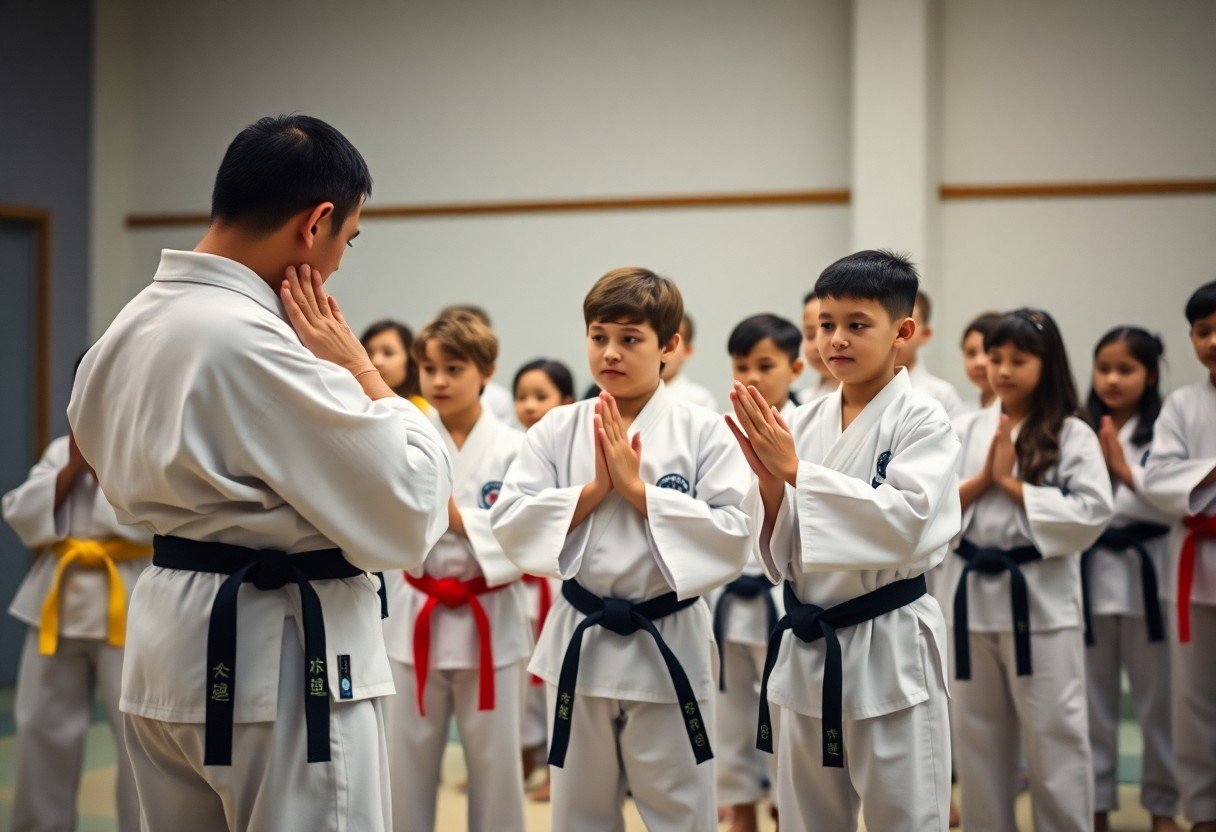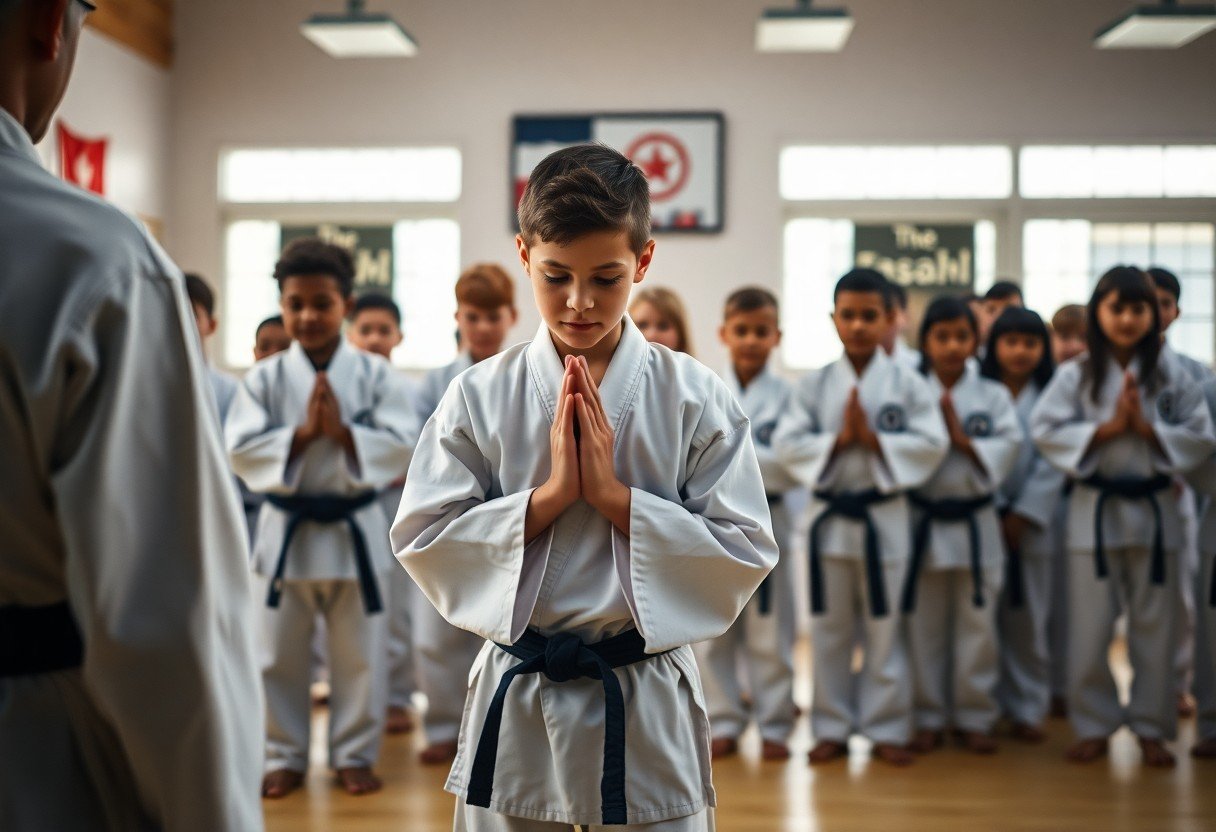It’s vital for you to instil respect and proper behaviour in your child when they engage in martial arts. This discipline not only fosters physical skills but also cultivates important values like humility, courtesy, and self-control. By emphasising etiquette in the dojo, you help your child understand the significance of respecting their instructors and peers, as well as the safe practice of martial arts techniques. In this blog post, we’ll explore key aspects of martial arts etiquette to ensure your child embraces these principles both on and off the mat.
Importance of Martial Arts Etiquette
Before you enter the world of martial arts, understanding the importance of etiquette is important. This code of conduct shapes the environment in which you train, promoting mutual respect and creating a positive atmosphere for learning. By adhering to established etiquette, you not only enhance your own experience but also contribute to the growth and harmony of the entire dojo.
Foundations of Respect
Respect is a fundamental principle in martial arts that extends beyond the dojo. You learn to honour your instructors, peers, and the traditions of the art. This attitude fosters a sense of community and supports the development of strong relationships, both inside and outside the training environment.
Discipline and Self-Control
Discipline is vital in martial arts training, as it cultivates self-control and focus. You develop the ability to manage your emotions and reactions, ensuring that you approach each challenge with a clear mind. This discipline carries over into daily life, helping you make better decisions and maintain composure in difficult situations.
And as you cultivate discipline and self-control, you begin to realise the profound impact it has on your personal growth and relationships. With consistent effort and practice, you can develop the ability to centre your thoughts and actions, making you less susceptible to distractions and emotional upheaval. Additionally, this self-discipline can be particularly important in high-pressure situations, where staying calm can mean the difference between success and failure. Ultimately, martial arts not only teaches you techniques for self-defence but also equips you with the tools to navigate the complexities of life with confidence.
Key Principles of Martial Arts Etiquette
Some of the key principles of martial arts etiquette centre around respect, discipline and humility. Understanding these values is fundamental to your martial arts journey, as they not only enhance your skills but also foster a sense of community. For further insights, you can explore The Heart of Martial Arts: Respect and Etiquette.
Respecting Instructors and Peers
About respecting your instructors and peers is important in martial arts. This respect fosters a positive training environment, encourages learning, and promotes personal growth. Always address your instructor appropriately, listen attentively, and extend courtesy to your fellow students, as each member plays a vital role in the dojo’s culture.
Proper Behavior on and off the Mat
At all times, your behaviour on and off the mat should reflect the values of martial arts. Upholding a sense of discipline, being punctual, and maintaining a gentle demeanour with peers is vital. Any form of disrespect or inappropriate behaviour within the dojo or outside can significantly impact not only your training but the overall ethos of the martial arts community.
Arts practice extends beyond physical proficiency; it cultivates a sense of responsibility and integrity. This includes being mindful of your actions, treating others with kindness, and demonstrating sportsmanship. Uphold these values consistently, as they shape both your character and the environment of your training space.
Teaching Kids Martial Arts Etiquette
Clearly, instilling martial arts etiquette in children goes beyond just physical training. It fosters respect, discipline, fitness and defence that is vital in their developmental journey. Engaging them in the values of respect and proper behaviour enhances their character both inside and outside the dojo.
Setting Expectations
Teaching your children what is expected in the martial arts environment is key. Establish clear guidelines for behaviour and manners, emphasizing respect towards instructors, peers, and the training space. This sets a foundation for their conduct and helps them develop a sense of responsibility.
Leading by Example
Example is a powerful teacher. When you, as a parent or instructor, embody the values of respect and discipline, your children will be more likely to emulate those behaviours. This connection between words and actions reinforces the importance of etiquette in martial arts, creating a positive environment for all.
In fact, when you consistently model appropriate behaviour, you set a robust precedent for your children. By demonstrating patience, humility, and respect in your interactions, you empower them to reflect these values in their own lives. Your actions can turn into a profound influence, making etiquette a natural part of their training journey.

Common Etiquette Mistakes
Now, it’s necessary to understand the common etiquette mistakes that can hinder the growth of respect and discipline in martial arts. These pitfalls can detract from your training experience and affect your relationships within the dojo.
Ignoring Traditions
Among the most overlooked aspects of martial arts is the adherence to traditions that give the practice its character. By neglecting these customs, you risk undermining the values that have been passed down through generations.
Disruptive Behavior
Common instances of disruptive behaviour can significantly affect the training environment. This includes talking excessively during lessons or failing to pay attention to instructors. Such actions not only disrupt your focus but also impede the learning experience for fellow students.
In fact, disruptive behaviour can lead to serious consequences, such as losing respect from instructors and peers. You might find that your inability to concentrate may result in poor skill development and affect the overall atmosphere in the dojo. Developing self-discipline and showing respect for others is vital in creating a positive space for learning martial arts. Take the initiative to foster a supportive environment by being attentive and considerate during training sessions.
Integrating Etiquette in Training
Keep etiquette at the forefront of your training programme. By embedding respectful behaviours into each lesson, you not only cultivate a positive atmosphere but also instil values that extend beyond the dojo. Consistently reinforce etiquette guidelines, and encourage your students to act as role models, demonstrating proper behaviour for their peers. This proactive approach ensures that respect becomes a natural part of their martial arts practice.
Incorporating Lessons in Class
Around the training mat, consider weaving etiquette lessons into every class. Discuss respectful behaviour during warm-ups or while learning techniques, emphasising the importance of bowing, listening, and showing gratitude towards instructors and fellow students. By integrating these lessons seamlessly, you help young martial artists appreciate the significance of behaviour in achieving their goals on and off the mat.
Encouraging Reflection and Discussion
Incorporating opportunities for reflection and discussion regarding etiquette can greatly enhance your students’ understanding. Create a culture of openness by inviting them to share their thoughts about respectful conduct during class and its impact on their training experience. This conversation not only promotes self-awareness but allows them to express their feelings and learn from each other, reinforcing the value of good behaviour.
Etiquette serves as a foundation for a positive learning environment. Encourage your students to reflect on their behaviour after each class, prompting them to identify positive actions or instances where they could improve. Engaging in discussions about why respect is important—both within martial arts and in life—can lead to profound growth. When your students share their experiences, it fosters a sense of community while reinforcing the idea that proper conduct is necessary for their success in achieving personal and collective goals.
Benefits of Practicing Etiquette in Martial Arts
Many martial arts practitioners often underestimate the importance of etiquette, but it lays the foundation for your entire training experience. By instilling respect and proper behaviour, you not only honour the traditions of the art but also foster a positive atmosphere that encourages personal growth, discipline, and camaraderie among participants.
Building Character
Below the surface of physical training, practising etiquette significantly impacts your character development. Adopting respectful behaviours helps you cultivate qualities like patience, humility, and integrity, imperative not only in martial arts but also in everyday life encounters.
Enhancing the Training Environment
To create an optimal training setting, etiquette acts as a guiding principle that shapes behaviours and interactions among students. When everyone demonstrates respect and proper conduct, it leads to a more harmonious atmosphere in your dojo or training space.
At your dojo, ensuring everyone adheres to proper etiquette promotes safety and focus, making each training session more effective. By encouraging mutual respect and collaborative spirit, you enhance both your experience and that of your fellow practitioners. This positive environment not only increases enthusiasm for training but also reduces the risk of conflicts and misunderstandings, allowing you to concentrate on mastering techniques and building valuable skills.
Final Words
Considering all points, instilling martial arts etiquette in your children is crucial for teaching them respect and proper behaviour. As you guide them through their training, emphasise the importance of discipline, humility, and courtesy, both on and off the mat. This foundation not only enhances their martial arts journey but also equips them with valuable life skills. By fostering these principles, you are setting your child on a path to become not only a proficient martial artist but also a respectful individual in society.
FAQ
Q: What is martial arts etiquette, and why is it important for children?
A: Martial arts etiquette refers to the set of rules and behaviours that practitioners are expected to follow within the dojo or training environment. It plays a significant role in teaching children respect for their instructors, peers, and the martial art itself. By instilling these values, children learn discipline, patience, and self-control, which can benefit them in many aspects of life.
Q: How can martial arts etiquette help children outside of the dojo?
A: The principles of martial arts etiquette extend beyond the training environment into daily life. Children learn to approach their interactions with others with respect and empathy, making them more considerate individuals. This can enhance their relationships with friends, family, and teachers, fostering a sense of community and cooperation.
Q: What specific behaviours are expected from children in a martial arts class?
A: In a martial arts class, children are expected to display a range of behaviours, including bowing to instructors and fellow students, listening attentively during lessons, maintaining a clean and tidy appearance, and showing sportsmanship during practice and competitions. These behaviours contribute to a respectful and focused learning environment.
Q: How can parents reinforce martial arts etiquette at home?
A: Parents can reinforce martial arts etiquette by encouraging discussions about respect and behaviour at home. They might set rules that reflect the values taught in class, promote positive reinforcement for displaying respectful behaviour, and model good etiquette in their own interactions. Involvement in their child’s martial arts journey can create a shared understanding and appreciation for these principles.
Q: What should a child do if they see someone else behaving improperly in class?
A: If a child notices someone behaving improperly, it’s important for them to approach the situation with sensitivity. They could report the behaviour to their instructor in a discreet manner rather than confronting the individual directly. This helps maintain a respectful atmosphere and teaches the child how to handle conflict with maturity and respect.



